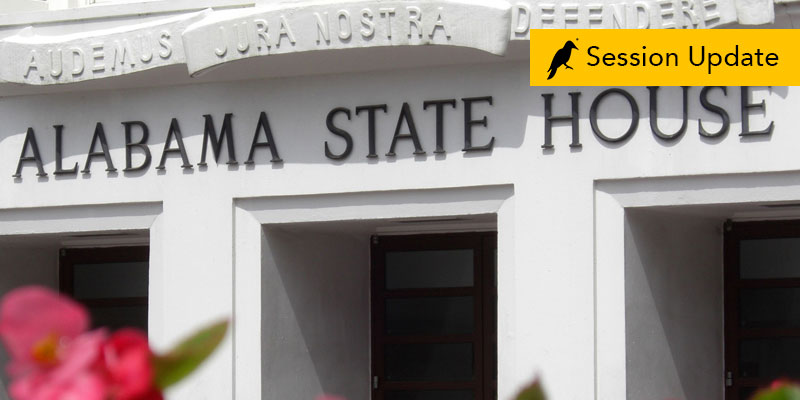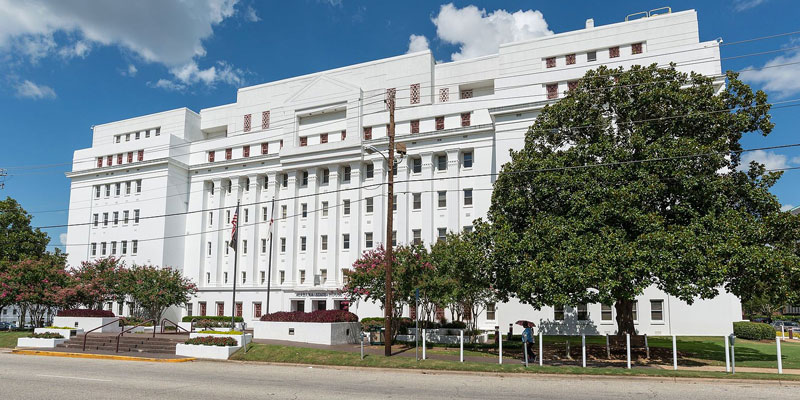MONTGOMERY — The Alabama legislature had a busy Thursday, passing a slew of impactful bills on what is expected to be the penultimate day of the 2019 regular session.
One of the most emotional, bipartisan acts of the session came with the passage of State Rep. Adline Clarke’s (D-Mobile) pay equity bill, HB 225. On the Senate floor the previous day, State Sen. Garlan Gudger (R-Cullman) surprised the chamber’s sponsor of the bill, State Sen. Vivian Davis-Figures (D-Mobile), by introducing an amendment that strengthened the bill and changed its name to the “Clarke-Figures Equal Pay Act” in honor the two sponsors.
This came after Figures on the floor expressed concern that the bill was going to die in the Senate. The chamber ended up passing the bill unanimously, following in the House’s footsteps in that regard.
On Thursday, the House concurred with the Senate amendment, sending the bill to Governor Kay Ivey’s desk. The governor quickly returned HB 225 to the legislature with a technical executive amendment, and – on the same day – both chambers concurred with the governor’s technical change, setting the landmark bill up to become law imminently.
Mississippi will now be the only state without a gender-based equal pay law. Clarke on Thursday said it was “a great day in Alabama.”
Read more about HB 225 here.
Alabama Literacy Act
State Rep. Terri Collins’ (R-Decatur) HB 388, known as the “Alabama Literacy Act,” passed the Senate as amended in a unanimous vote on Thursday.
The House then concurred with the Senate’s amended version, sending the transformative bill to the governor’s desk.
This bill would require third graders to pass a reading test before advancing to fourth grade.
If signed into law, the Alabama Literacy Act would go into effect for the 2021-2022 school year. The legislation also includes several initiatives intended to boost reading scores.
Read more about HB 388 here.
General Fund budget
Both chambers of the Alabama legislature on Thursday concurred with the conference committee’s report on the General Fund budget bill, HB 152, sending the legislation to the governor’s desk.
In a statement after the bill’s final passage, Ivey signaled her support for the budget, which featured a two percent raise for state employees.
“While remaining steadfast in our fiscally conservative approach, we have put forward a General Fund, which provides important funding that moves our state in a positive direction,” she said.
Core promises were kept in the General Fund budget, including Ivey’s State of the State pledge to return $35 million of annual “diversion” to roads and bridges that had been going to cover a shortfall in ALEA and court system funding.
The governor outlined, “Very importantly, we are wisely using our dollars to tackle some of our state’s major challenges. From areas of public safety to mental health, our state is making great strides. I am very proud that this year’s budget returns $35 million to our Road and Bridge Fund. I applaud General Fund Chairs Rep. Clouse and Sen. Albritton for their tremendous leadership on this legislation. The Alabama Legislature can be proud of this strong budget.”
Senate President Pro Tem Del Marsh (R-Anniston) also released a statement upon final passage of the General Fund budget.
“I want to commend Sen. Albritton on passage of his first General Fund budget,” Marsh said. “Although this is usually a thankless job, Sen. Albritton did an excellent job of working with the General Fund Committee, Senators on the floor, colleagues in the House, as well as countless hours behind the scenes to ensure that this budget was fair to everyone in Alabama.”
“This is a budget that received bipartisan support and that all Senators can be proud of. Through conservative fiscal practices and living within our means we have been able to come out with a robust budget that provides funding for state agencies including more money to our corrections system to hire new officers, money to hire new state troopers, an increase to Mental Health and a sizable reserve for future budgets. I thank everybody for their diligent work,” he concluded.
The General Fund budget ended up covering all $35 million for CHIP, even though the governor had proposed this being funded through the Education Trust Fund (ETF).
Read more about HB 152 here.
The ETF budget bill is scheduled for conference committee at 9:00 a.m. on Friday and is expected to be approved by both chambers and then head to the governor’s desk that same day. The ETF budget and the package of SB’s 397 and 398 are the key outstanding items left before the legislature can adjourn sine die.
Civil asset forfeiture
State Sen. Arthur Orr’s (R-Decatur) SB 191 passed the House on Thursday, sending the bill to the governor’s desk.
The final version of the legislation was a compromise, which has also been called a “watered down” substitute that Orr reached with stakeholders concerned the bill would hurt law enforcement’s ability to do their jobs.
If SB 191 becomes law, law enforcement agencies would still be able to civilly seize assets without a criminal conviction. However, the legislation does mandate that law enforcement agencies report how often they use civil actions to seize a person’s property when said person has not been convicted of a crime.
Orr has said the measure as passed is an “incremental” step and that he plans on reintroducing a bill to ban the practice of civil asset forfeiture again next year.
SB 191 passed unanimously in both chambers and brought hardline conservatives together with leftwing factions on policy in a rare circumstance.
State Rep. Andrew Sorrell (R-Muscle Shoals) joked that this bill even managed to bring him together with the SPLC, something he thought he would never say.
In a statement after SB 191’s final passage, Emily Early, staff attorney for SPLC Action Fund, applauded the legislature but agreed with Orr’s desire for a bill that goes further.
“A mandatory reporting system for civil asset forfeiture can help ensure the civil asset forfeiture law is not abused or used primarily to create revenue for the government,” Early said. “SB 191 recognizes the importance of the mandatory collection of information about civil forfeitures in reaching this goal, but does not go far enough in ending the abusive practice altogether.”
“While we applaud the efforts of our state legislators in taking this step towards protecting the property and due process rights of Alabamians across the state and urge Governor Ivey to sign SB 191 without delay, it’s not enough for the actors who profit from civil asset forfeiture to simply report what they take from Alabamians,” she added. “In future legislative sessions, we hope and expect that lawmakers will learn from the data provided through this new law and give Alabamians the necessary relief they deserve constitutionally by ensuring that a criminal conviction is required before any property is forfeited to the state.”
Will the Bible be back (kind of) in public schools?
State Sen. Tim Melson’s (R-Florence) SB 14, the bill to allow elective biblical literacy classes to be taught in public schools, received final passage by the legislature on Thursday.
The final version of the bill clarified that this proposed law is not only nondenominational, but that the legislation would not just allow the Christian Bible to be taught. The Torah and the Quran were both mentioned as other options allowed under the bill.
Local school districts would get the choice to offer these strictly elective classes, which would not be intended to be faith-based classes but instead be essentially historical in nature, allowing the “objective” study of religious texts, artifacts, monuments, symbols, etc.
Under the bill, school districts would not be mandated to offer the classes, nor would any student be forced to take one of the classes.
SB 14 also spells out, “A teacher of a course offered pursuant to this act may not endorse, favor, promote, disfavor, or show hostility toward any particular religion or nonreligious faith or religious perspective.”
Melson has one piece of hot-button legislation still pending, although it has become a “watered down version.” His medical marijuana bill was substituted in a House committee earlier this week to set up a commission to study the issue. The bill is still awaiting consideration on the House floor.
In case you missed it:
The legislature also gave final passage to HB 540 and HB 380 on Thursday. Both bills are expected to become law.
Additionally, the governor held a signing ceremony for two major broadband bills: SB 90 and HB 400.
This came after Ivey the day previous held a joint signing ceremony for some previously passed legislation, including HB 468, SB 147, HB 287, HB 479, HJR 91, SB 138 and HB 402.
Sean Ross is a staff writer for Yellowhammer News. You can follow him on Twitter @sean_yhn













